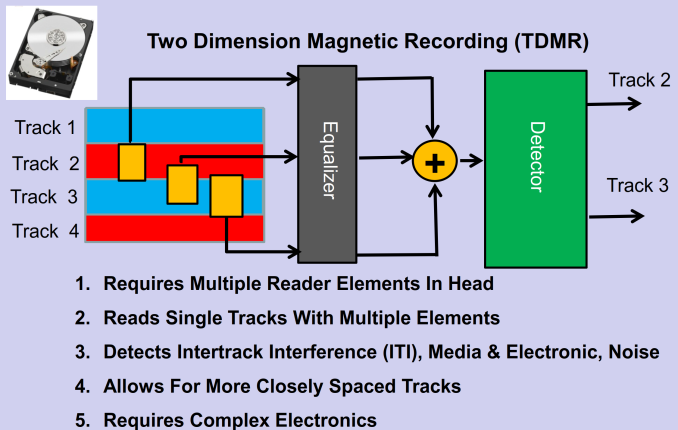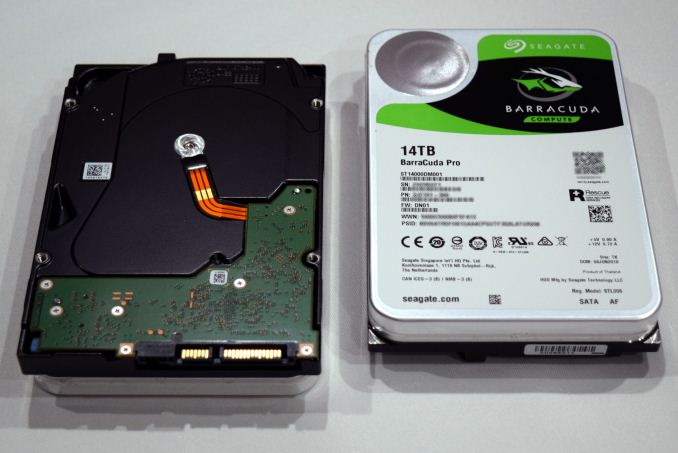Seagate BarraCuda Pro 14TB HDD Review: Massive Storage for Desktops
by Ganesh T S on September 10, 2018 8:01 AM ESTMiscellaneous Aspects and Concluding Remarks
The BarraCuda Pro 14TB drive helps Seagate retain their pole position in terms of offering the highest capacity drives for desktops and home consumers. Over the last three years, they have consistently been able to raise the bar, starting from 10TB, on to 12TB, and now, 14TB. Like the 12TB version from last year, the 14TB version also features eight PMR platters in a helium-filled sealed enclosure. The key to the increase in areal density lies in two-dimensional magnetic recording (TDMR). Prior to offering some concluding remarks, a brief look at TDMR could help some readers in appreciating Seagate's technological advancements that have resulted in the BarraCuda Pro 14TB drive.
Two-Dimensional Magnetic Recording
Hard drives store data in platters with a magnetic medium. A platter has magnetic grains spread all over, and each bit is stored in a magnetic region with hundreds of magnetic grains. The 'heads' travel over the platters to write data by magnetizing certain regions, or, read the data from the region. Due to the circular nature of the platters that are mounted on a spindle, these magnetic regions are arranged in circular tracks. One of the key components of the areal density (i.e, number of bits that can be stored in a given platter area) is the 'tracks per inch' metric. Making the tracks narrow helps drive the areal density up. However, making them too narrow makes it difficult for the reading head. Since making the heads smaller is physically challenging, narrow tracks end up making the reader see more of the adjacent tracks and driving up the noise factor.

TDMR Operation (Source: The Magnetic Hard Disk Drive - Today's Technical Status and Future, Dr. Edward Grochowski and Dr. Peter Goglia, SNIA Data Storage Conference, 2016)
The TDMR solution puts two (or more) readers on the same track or partially on adjacent tracks. This provides a better idea of the interference effects and can help in cancelling out the noise. The first generation of TDMR only implements two heads partially on adjacent tracks to be able to read out the data in the narrow tracks with better confidence. It is envisaged that advancements in TDMR will eventually result in 3 or even more readers and the number of grains needed per user bit will also go down. In theory, TDMR can also be used to improve read throughput, but, the first generation implementations do not seem to be taking advantage of that possibility (at least in the consumer-focused drives such as the BarraCuda Pro 14TB we looked at today).
Final Words
Desktop hard drives are typically not rated for 24x7 operation, but, the BarraCuda Pro series bucks that trend. In addition to a 300TB/yr workload rating, Seagate also provides a 5-year warranty and, with product registration, 2 years of data recovery services. The lower load/unload cycles rating (300K, compared to the 600K in the IronWolf Pro NAS drives) and MTBF (1M hours, compared to 1.2M for the Pro NAS drive) are slightly disappointing aspects, but, they are made up for by the warranty and DRS.
In the desktop gaming market, per-game storage requirements are running into 100s of GBs, and SSDs continue to remain above $0.20/GB. Under these circumstances, high-capacity hard drives are continuing to remain relevant. In our evaluation, the BarraCuda Pro 14TB managed to perform quite well for largely sequential workloads (typical of bulk storage requirements in gaming workloads). Consumers dealing with content creation can also use the BarraCuda Pro as part of a direct-attached storage system. For single-user scenarios, a DAS inherently makes more sense than a NAS. It allows use of enclosures sporting interfaces with higher speeds. The BarraCuda Pro 14TB drive shows great performance in such devices.
Similar to the 10TB and 12TB versions that we had evaluated in the last couple of years, the 14TB version leaves very little to complain about. The launch price of $580 is $50 more than the 12TB version's MSRP when it was introduced last year. That said, in terms of launch MSRPs, the cost per GB metric is still in the 14TB's favor (4.14c/GB vs. 4.42c/GB). However, the 12TB version's current street price is just $440 (3.67c/GB). All said, it must be noted that the BarraCuda Pro 14TB is a pure capacity play. It doesn't deliver any marked performance improvements over either the 10TB or the 12TB versions released in the previous years. However, it does enable users to have more local / direct-attached storage per 3.5" drive bay than ever before at consumer price points.











65 Comments
View All Comments
SSTANIC - Monday, September 10, 2018 - link
First. Why is there no sound/noise paragraph? What does this drive have that a Seagate Exos SATA 14TB enterprise drive doesn't have? Why is the price set so high for 10/12/14TB HDDs? How do I turn off video autoplay on anandtech.com please? Turning it off in Chrome doesn't seem to do it. Tnxsvan1971 - Monday, September 10, 2018 - link
Ublock Origin deals the videos and ads very well.xenol - Monday, September 10, 2018 - link
Autoplaying HTML5 videos, if it is such, is a browser feature. Out of the box, your options are "yes" or "no." And while it's tempting to say "no" it presents another problem: YouTube and other streaming sites that switched to HTML5 won't automatically start playing.FLHerne - Monday, September 10, 2018 - link
Browsers with autoplay enabled will only start HTML5 elements containing an 'autoplay' attribute -- i.e. it's Anandtech's choice to have their videos start playing for no reason unless we disable the feature globally.Even on YouTube it can be annoying sometimes.
GreenReaper - Tuesday, September 11, 2018 - link
Firefox is doing it so that you can select per-site now, as well as globally. Not sure about Chrome.PeachNCream - Monday, September 10, 2018 - link
The autoplaying video is one of AT's worst moves. For those of us that want to support the site by allowing additional advert content, it comes off as a kick in the face. It doesn't appear that there will be any sort of response. Download Firefox, grab Adblock, and get NoScript. Between those two you'll have a much happier browsing experience and you'll get away from Chrome acting as a conduit on your PC to enable Google to creep on everything you do through your web browser.kaidenshi - Monday, September 10, 2018 - link
I think uBlock Origin would be a better choice than Adblock, whose creators get a kickback from ads they whitelist which goes against the whole point of having an ad blocker.You can actually turn off autoplay HTML5 videos in Firefox by going to about:config and setting media.autoplay.enable to "False".
PeachNCream - Tuesday, September 11, 2018 - link
You can easily turn off the whitelist in Adblock. I didn't know about the autoplay disable functionality though. That's actually quite useful so thank you!rahvin - Monday, September 10, 2018 - link
You should remember AT was sold recently to a major aggregator, you should expect more of this autoplay BS not less. Maybe it's time to find a new review site?milkod2001 - Tuesday, September 11, 2018 - link
'For those of us that want to support the site by allowing additional advert content'it does not really matter if you allow it or not. What matters for them is to get you to click on them ads. If you only allow ad and don't click you are not helping them :)